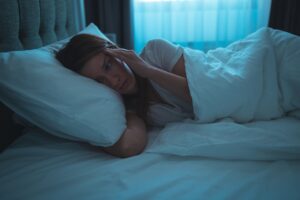
Read on to discover what causes this increased risk, tips for dealing with insomnia, and how to help protect yourself against possible long-term complications.
The new study from Alexandria University in Alexandria, Egypt, included a systematic review of the literature that yielded 1,226 studies, including nine studies from the U.S., United Kingdom, Norway, Germany, Taiwan and China. Altogether, the data for 1,184,256 adults was assessed. 43% were women, and the average age was 52 years.
Of all participants, 13% (153,881) had insomnia, which was defined based on ICD diagnostic codes or by the presence of three specific symptoms. These symptoms included difficulty falling asleep, difficulty staying asleep, or waking early and not being able to get back to sleep. People who were previously diagnosed with obstructive sleep apnea were not included, and most participants did not have a prior history of heart attack.
Based on the findings, there was a significant association between insomnia and having a heart attack. Outcomes were controlled for other factors that could increase the risk of heart attack, including age, gender, smoking, and comorbidities. The study concluded that people who suffer from insomnia were 69% more likely to have a heart attack than those who didn’t have a sleep disorder during an average of nine years of follow-up. It was also noted that people with insomnia are more likely to have a heart attack regardless of age, and heart attacks occurred more often in women with insomnia.
Researchers also found that people who reported five or fewer hours of sleep a night were 138 and 1.56 times more likely to experience a heart attack compared to those who slept six and seven to eight hours a night. The findings also supported previous studies that found getting too little or too much sleep can harm heart health, as there was no difference in heart attack risk between five hours or nine or more hours of sleep.
“Not surprisingly, people with insomnia who also had high blood pressure, cholesterol or diabetes had an even higher risk of having a heart attack than those who didn’t,” said Yomna E. Dean, study author. “People with diabetes who also have insomnia had a twofold likelihood of having a heart attack.”
Based on this information, researchers believe that insomnia should be considered a risk factor for developing a heart attack. Healthcare professionals need to better educate people about how dangerous a lack of sleep can be, and more screening needs to be done to help people understand the risk of cardiovascular diseases.
Insomnia may be the most common sleep disorder, but it can be avoided in many ways. Practicing good sleep hygiene can go a long way to helping reduce insomnia. This includes sleeping in a dark, cool room and limiting screen time to a few hours before bedtime. Practicing calming techniques such as meditation can also help with falling asleep.
Promoting Optimal Sleep
Sleep Sure Plus is designed to help promote optimal sleep and restfulness through various ingredients. One of the most important ingredients included in this unique formula is melatonin.
Melatonin is a hormone essential for regulating the circadian rhythm (the internal clock of the body). Sleep Sure Plus also contains valerian, one of the best natural ingredients for promoting rest and relaxation. These two essential ingredients are joined by another 6, which all work together to provide a better quality of sleep.